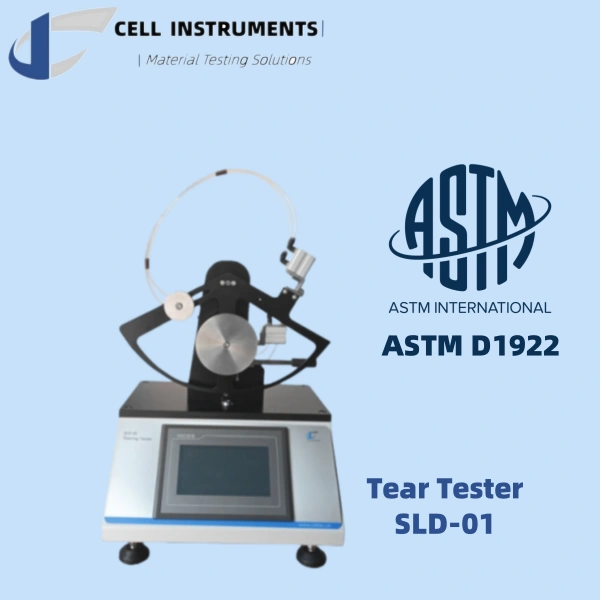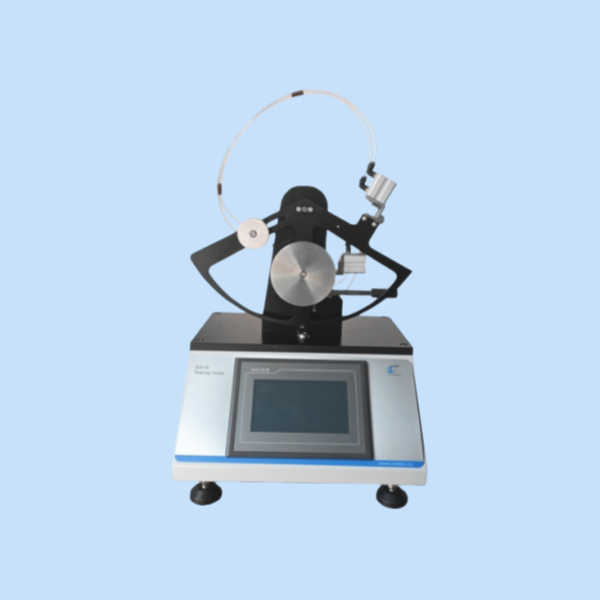ASTM D1922
SLD-01 Tear Tester Test Method
In the packaging, film manufacturing, and quality assurance industries, the ability of a plastic film to resist tearing is crucial. The ASTM D1922 test method is one of the most widely recognized standards used to determine the tear strength of plastic film and other nonrigid sheeting materials. It uses an Elmendorf tear tester to quantify the average force needed to propagate a tear, providing critical data for evaluating material performance.
Elmendorf Tear Resistance: Why ASTM D1922 Matters
Elmendorf tear resistance is a fundamental mechanical property for materials like polyethylene, polypropylene, polyester, and other films used in flexible packaging. The ASTM D1922 standard outlines a consistent, repeatable method to evaluate this property.
The significance of ASTM D1922 lies in its ability to:
- Quantify tear strength in both machine and transverse directions.
- Reveal material anisotropy, especially in oriented films.
- Simulate tear conditions similar to actual packaging use.
This method is particularly beneficial for comparing tear resistance across material batches, ensuring film consistency in production, and verifying supplier specifications.
Key Principles Behind ASTM D1922 Testing
ASTM D1922 measures tear propagation using a pendulum-type Elmendorf tear tester. A precut specimen is clamped between a stationary arm and a movable pendulum arm. Upon release, the pendulum tears the sample along the precut slit. The energy lost during this process, as indicated by the pendulum’s arc, corresponds to the material’s tear strength.
This test provides a quantitative reading of tear force in millinewtons (mN) or grams-force (gf), depending on the device’s configuration. It is essential to consider factors like:
- Specimen orientation (machine vs. transverse direction)
- Specimen thickness, which should be reported but not directly correlated with tearing force
- Test conditions, such as temperature and humidity, which must follow ASTM guidelines (typically 23 ± 2°C and 50 ± 10% RH)
Tear Strength of Plastic Film: Real-World Relevance
Plastic films used in food packaging, pharmaceutical wrapping, and industrial applications often face mechanical stress. A film with poor tear strength might rupture during filling, sealing, or transport, leading to:
- Product loss
- Shelf-life reduction
- Brand reputation damage
ASTM D1922 enables material developers and QC professionals to select the most durable films for specific applications. It also helps packaging manufacturers set acceptable performance thresholds during new product development.
The Role of Elmendorf Tear Tester in ASTM D1922
An Elmendorf tear tester is an essential instrument in this test method. It provides:
- Repeatable test mechanics, with pendulum energy calibrated per ASTM guidelines
- Precise digital readouts, minimizing interpretation error
- Consistent clamping, ensuring uniform tear path
Cell Instruments offers the SLD-01 Elmendorf Tear Tester, a reliable solution for laboratories and production floors. The SLD-01 is compliant with ASTM D1922 and ISO 6383-2, featuring:
- Configurable pendulum weights for various material types
- Digital results display with data logging capability
- Sturdy construction for long-term accuracy and reliability
This device is ideal for quality control in plastic film manufacturing, flexible packaging evaluation, and research labs analyzing polymer behavior under mechanical stress.
Choosing the Right Co-efficient of Friction Tester
Cell Instruments Co., Ltd. specializes in film and packaging material testing solutions. With years of experience serving industries such as pharmaceuticals, food, electronics, and medical packaging, we understand the demand for precise, reproducible data.
We support our clients with:
- High-performance instruments, like the SLD-01
- Custom testing setups for specialized films
- Automation and data integration to streamline QC processes
Contact Us Get ASTM D1894 Testing Solution
Understanding and applying the ASTM D1922 test method is essential for evaluating Elmendorf tear resistance and ensuring the tear strength of plastic films meets application demands. Whether you’re developing new materials, validating production batches, or conducting comparative analysis, ASTM D1922 provides a standardized, internationally recognized approach.
By incorporating the SLD-01 Elmendorf Tear Tester from Cell Instruments into your lab or production workflow, you gain access to accurate, efficient, and standards-compliant testing — enabling better decisions and improved product quality.


